Business Law Report: Legal Systems, Consumer & Employment Law
VerifiedAdded on 2019/09/22
|15
|4043
|351
Report
AI Summary
This report provides a detailed overview of various aspects of business law in the United Kingdom. It begins by outlining different types of legal systems practiced in the UK, including statutory law, common law, and equity, as well as criminal and property law. The report then explores the impact of contract law on businesses, emphasizing its role in protecting rights and mitigating risks, alongside the influence of intellectual property rights. Furthermore, it delves into consumer and company law, explaining trade description laws, consumer rights, and consumer safety laws, along with the process of company formation. Finally, the report examines employment law, covering company nature, employee rights, and the responsibilities of companies regarding employee health and benefits. The report provides insights into how businesses operate within the legal framework, along with the relevant laws and regulations.
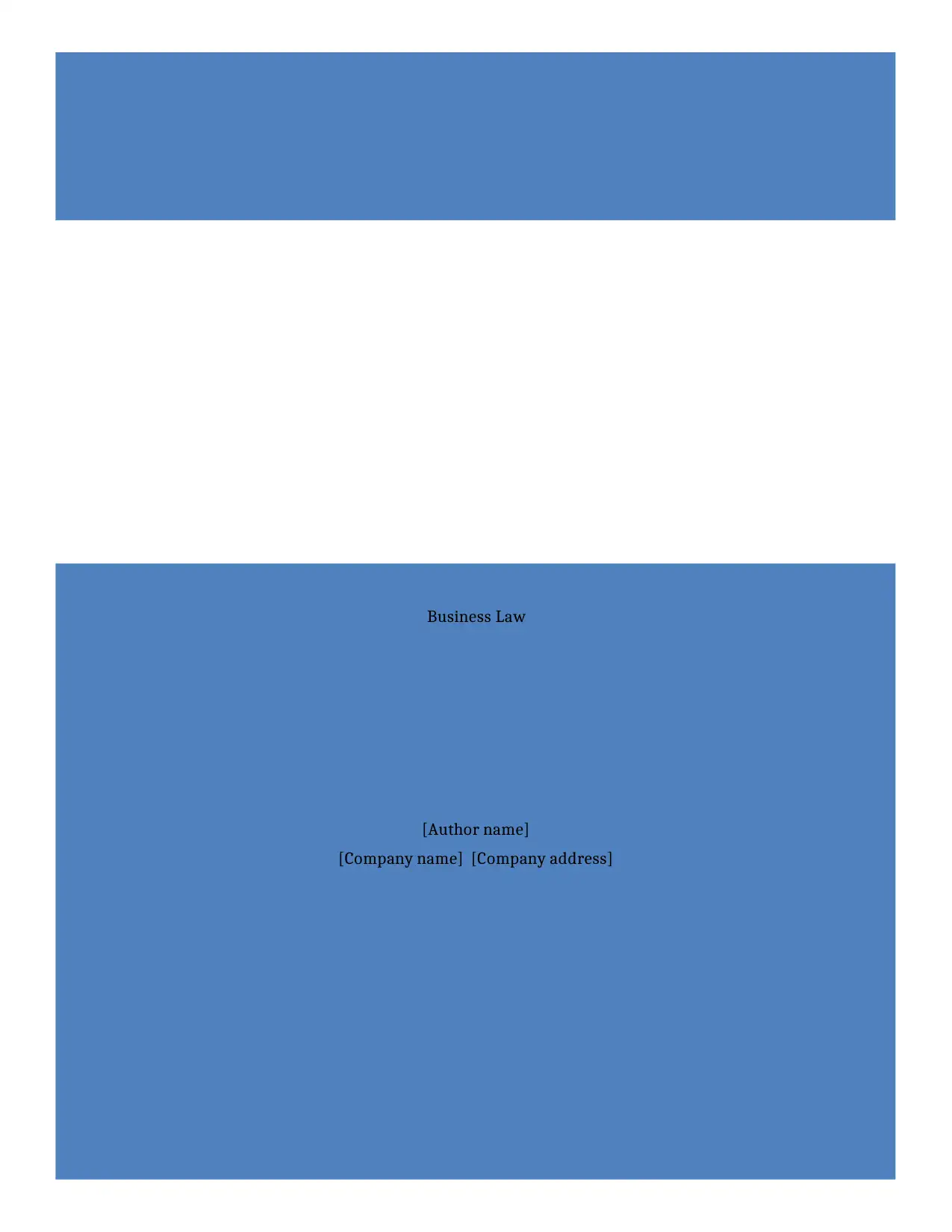
Business Law
[Author name]
[Company name] [Company address]
[Author name]
[Company name] [Company address]
Paraphrase This Document
Need a fresh take? Get an instant paraphrase of this document with our AI Paraphraser
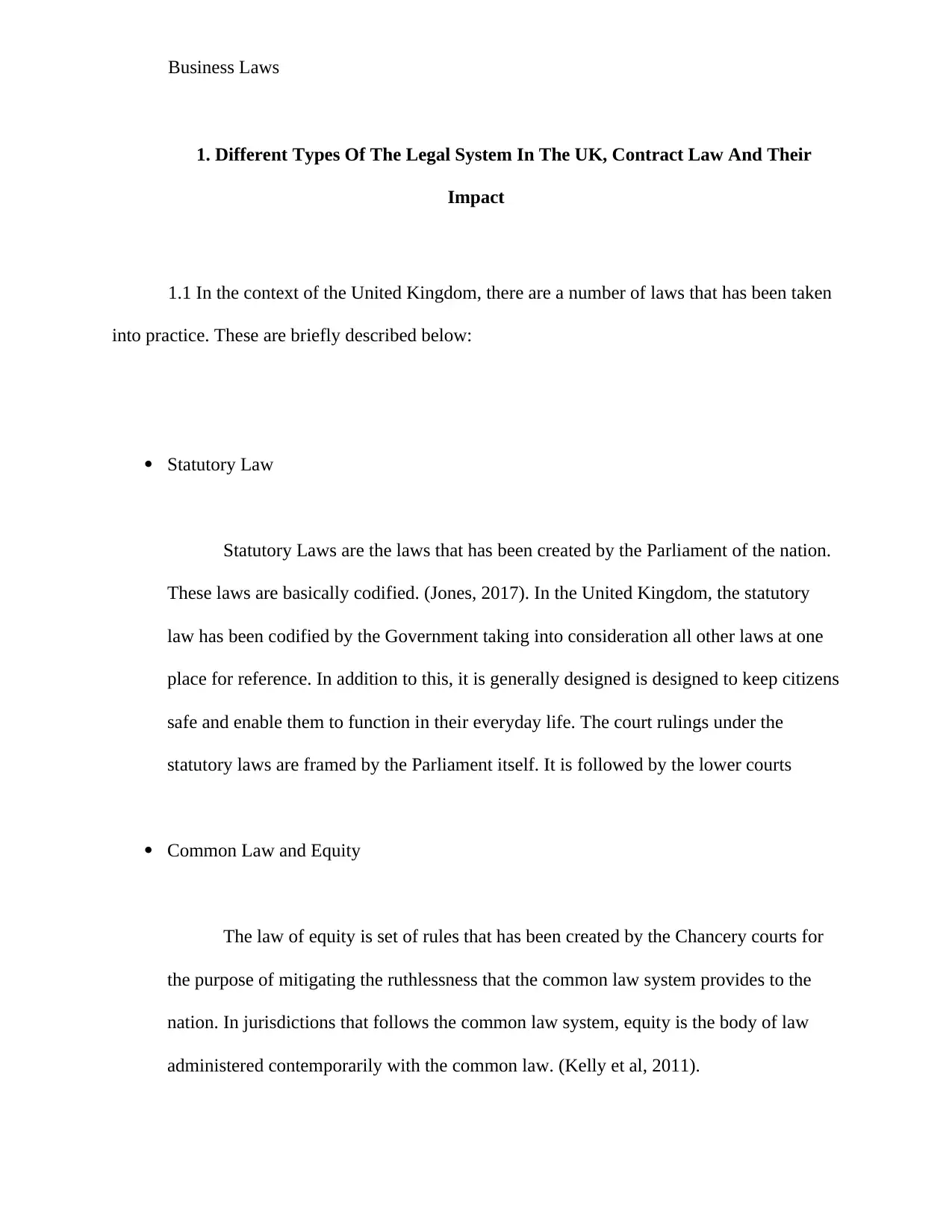
Business Laws
1. Different Types Of The Legal System In The UK, Contract Law And Their
Impact
1.1 In the context of the United Kingdom, there are a number of laws that has been taken
into practice. These are briefly described below:
Statutory Law
Statutory Laws are the laws that has been created by the Parliament of the nation.
These laws are basically codified. (Jones, 2017). In the United Kingdom, the statutory
law has been codified by the Government taking into consideration all other laws at one
place for reference. In addition to this, it is generally designed is designed to keep citizens
safe and enable them to function in their everyday life. The court rulings under the
statutory laws are framed by the Parliament itself. It is followed by the lower courts
Common Law and Equity
The law of equity is set of rules that has been created by the Chancery courts for
the purpose of mitigating the ruthlessness that the common law system provides to the
nation. In jurisdictions that follows the common law system, equity is the body of law
administered contemporarily with the common law. (Kelly et al, 2011).
1. Different Types Of The Legal System In The UK, Contract Law And Their
Impact
1.1 In the context of the United Kingdom, there are a number of laws that has been taken
into practice. These are briefly described below:
Statutory Law
Statutory Laws are the laws that has been created by the Parliament of the nation.
These laws are basically codified. (Jones, 2017). In the United Kingdom, the statutory
law has been codified by the Government taking into consideration all other laws at one
place for reference. In addition to this, it is generally designed is designed to keep citizens
safe and enable them to function in their everyday life. The court rulings under the
statutory laws are framed by the Parliament itself. It is followed by the lower courts
Common Law and Equity
The law of equity is set of rules that has been created by the Chancery courts for
the purpose of mitigating the ruthlessness that the common law system provides to the
nation. In jurisdictions that follows the common law system, equity is the body of law
administered contemporarily with the common law. (Kelly et al, 2011).
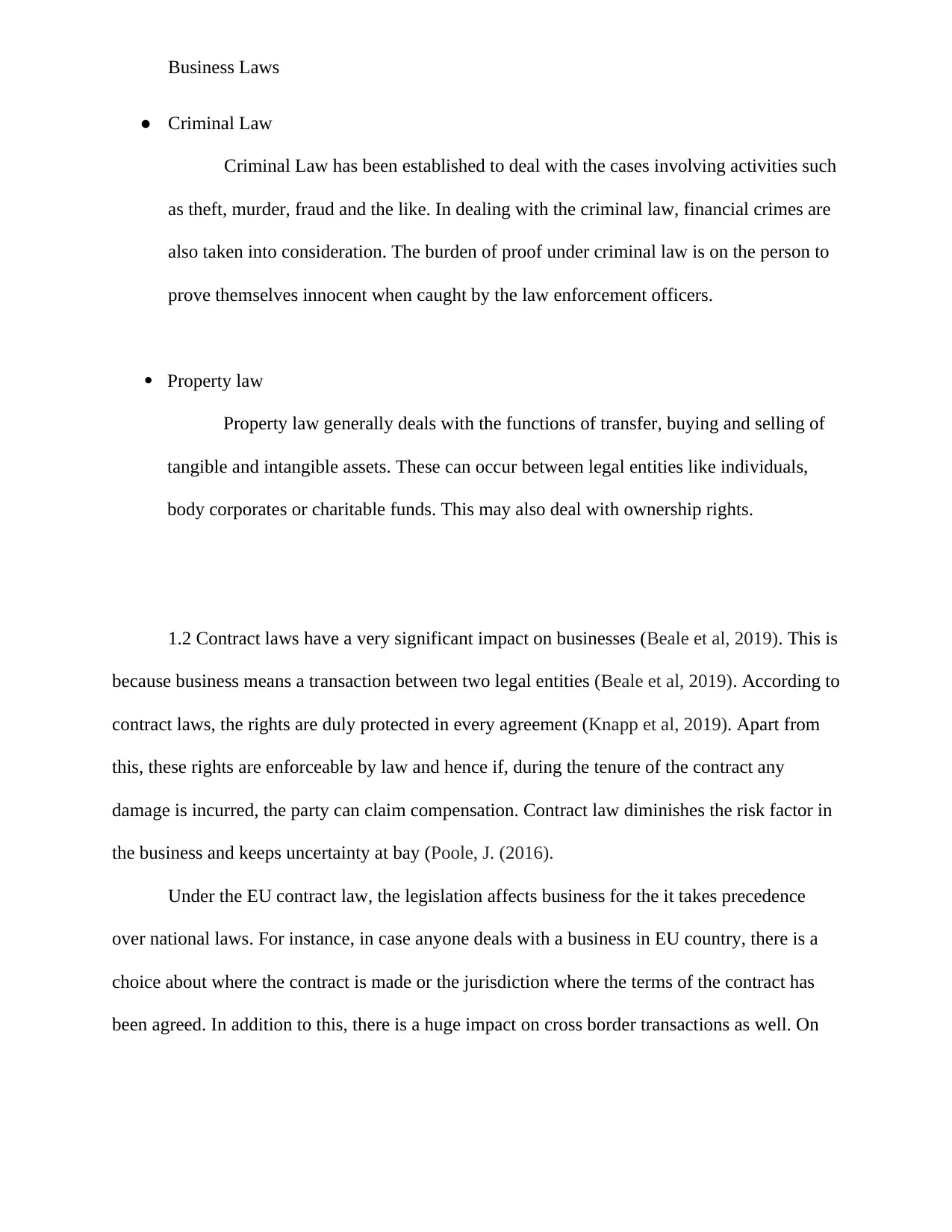
Business Laws
● Criminal Law
Criminal Law has been established to deal with the cases involving activities such
as theft, murder, fraud and the like. In dealing with the criminal law, financial crimes are
also taken into consideration. The burden of proof under criminal law is on the person to
prove themselves innocent when caught by the law enforcement officers.
Property law
Property law generally deals with the functions of transfer, buying and selling of
tangible and intangible assets. These can occur between legal entities like individuals,
body corporates or charitable funds. This may also deal with ownership rights.
1.2 Contract laws have a very significant impact on businesses (Beale et al, 2019). This is
because business means a transaction between two legal entities (Beale et al, 2019). According to
contract laws, the rights are duly protected in every agreement (Knapp et al, 2019). Apart from
this, these rights are enforceable by law and hence if, during the tenure of the contract any
damage is incurred, the party can claim compensation. Contract law diminishes the risk factor in
the business and keeps uncertainty at bay (Poole, J. (2016).
Under the EU contract law, the legislation affects business for the it takes precedence
over national laws. For instance, in case anyone deals with a business in EU country, there is a
choice about where the contract is made or the jurisdiction where the terms of the contract has
been agreed. In addition to this, there is a huge impact on cross border transactions as well. On
● Criminal Law
Criminal Law has been established to deal with the cases involving activities such
as theft, murder, fraud and the like. In dealing with the criminal law, financial crimes are
also taken into consideration. The burden of proof under criminal law is on the person to
prove themselves innocent when caught by the law enforcement officers.
Property law
Property law generally deals with the functions of transfer, buying and selling of
tangible and intangible assets. These can occur between legal entities like individuals,
body corporates or charitable funds. This may also deal with ownership rights.
1.2 Contract laws have a very significant impact on businesses (Beale et al, 2019). This is
because business means a transaction between two legal entities (Beale et al, 2019). According to
contract laws, the rights are duly protected in every agreement (Knapp et al, 2019). Apart from
this, these rights are enforceable by law and hence if, during the tenure of the contract any
damage is incurred, the party can claim compensation. Contract law diminishes the risk factor in
the business and keeps uncertainty at bay (Poole, J. (2016).
Under the EU contract law, the legislation affects business for the it takes precedence
over national laws. For instance, in case anyone deals with a business in EU country, there is a
choice about where the contract is made or the jurisdiction where the terms of the contract has
been agreed. In addition to this, there is a huge impact on cross border transactions as well. On
⊘ This is a preview!⊘
Do you want full access?
Subscribe today to unlock all pages.

Trusted by 1+ million students worldwide
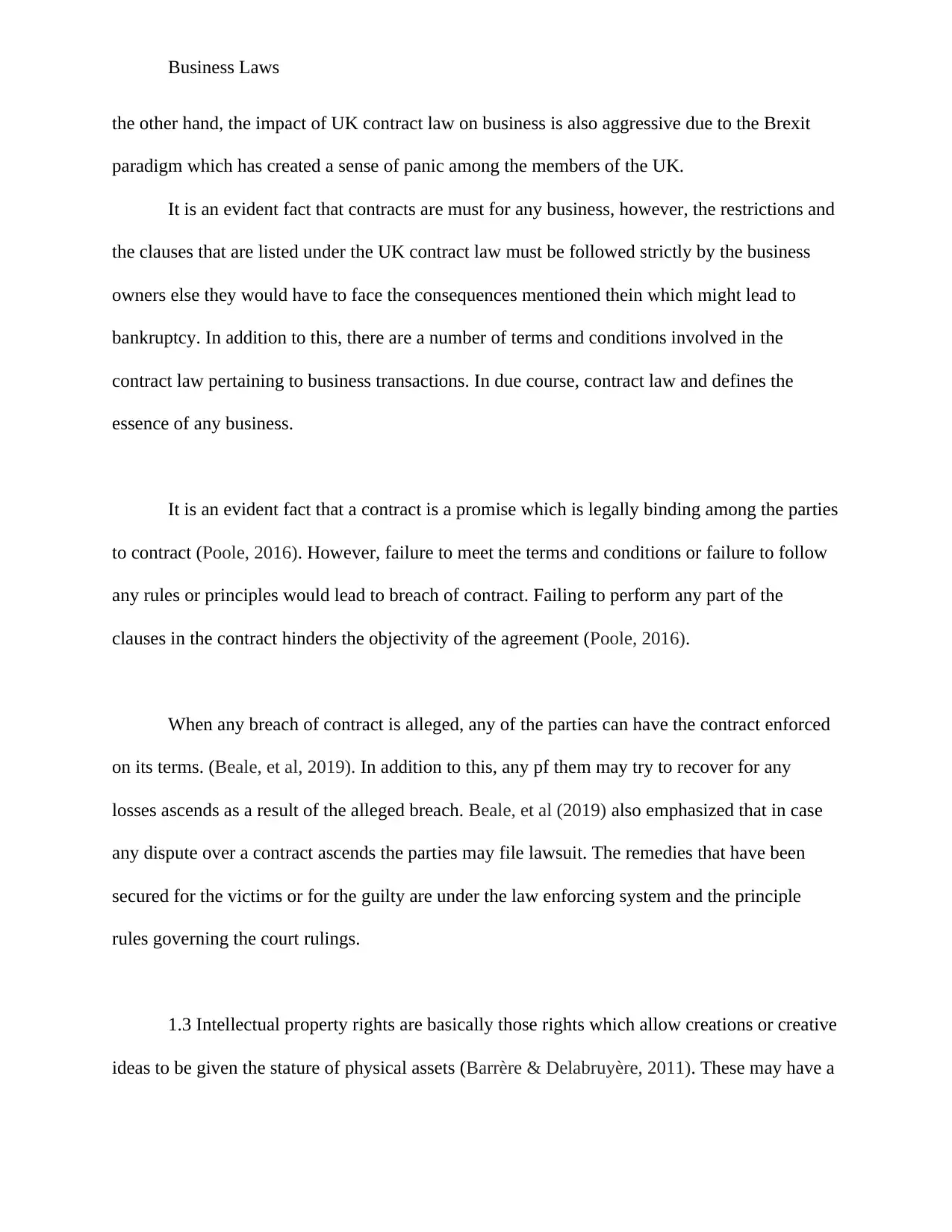
Business Laws
the other hand, the impact of UK contract law on business is also aggressive due to the Brexit
paradigm which has created a sense of panic among the members of the UK.
It is an evident fact that contracts are must for any business, however, the restrictions and
the clauses that are listed under the UK contract law must be followed strictly by the business
owners else they would have to face the consequences mentioned thein which might lead to
bankruptcy. In addition to this, there are a number of terms and conditions involved in the
contract law pertaining to business transactions. In due course, contract law and defines the
essence of any business.
It is an evident fact that a contract is a promise which is legally binding among the parties
to contract (Poole, 2016). However, failure to meet the terms and conditions or failure to follow
any rules or principles would lead to breach of contract. Failing to perform any part of the
clauses in the contract hinders the objectivity of the agreement (Poole, 2016).
When any breach of contract is alleged, any of the parties can have the contract enforced
on its terms. (Beale, et al, 2019). In addition to this, any pf them may try to recover for any
losses ascends as a result of the alleged breach. Beale, et al (2019) also emphasized that in case
any dispute over a contract ascends the parties may file lawsuit. The remedies that have been
secured for the victims or for the guilty are under the law enforcing system and the principle
rules governing the court rulings.
1.3 Intellectual property rights are basically those rights which allow creations or creative
ideas to be given the stature of physical assets (Barrère & Delabruyère, 2011). These may have a
the other hand, the impact of UK contract law on business is also aggressive due to the Brexit
paradigm which has created a sense of panic among the members of the UK.
It is an evident fact that contracts are must for any business, however, the restrictions and
the clauses that are listed under the UK contract law must be followed strictly by the business
owners else they would have to face the consequences mentioned thein which might lead to
bankruptcy. In addition to this, there are a number of terms and conditions involved in the
contract law pertaining to business transactions. In due course, contract law and defines the
essence of any business.
It is an evident fact that a contract is a promise which is legally binding among the parties
to contract (Poole, 2016). However, failure to meet the terms and conditions or failure to follow
any rules or principles would lead to breach of contract. Failing to perform any part of the
clauses in the contract hinders the objectivity of the agreement (Poole, 2016).
When any breach of contract is alleged, any of the parties can have the contract enforced
on its terms. (Beale, et al, 2019). In addition to this, any pf them may try to recover for any
losses ascends as a result of the alleged breach. Beale, et al (2019) also emphasized that in case
any dispute over a contract ascends the parties may file lawsuit. The remedies that have been
secured for the victims or for the guilty are under the law enforcing system and the principle
rules governing the court rulings.
1.3 Intellectual property rights are basically those rights which allow creations or creative
ideas to be given the stature of physical assets (Barrère & Delabruyère, 2011). These may have a
Paraphrase This Document
Need a fresh take? Get an instant paraphrase of this document with our AI Paraphraser
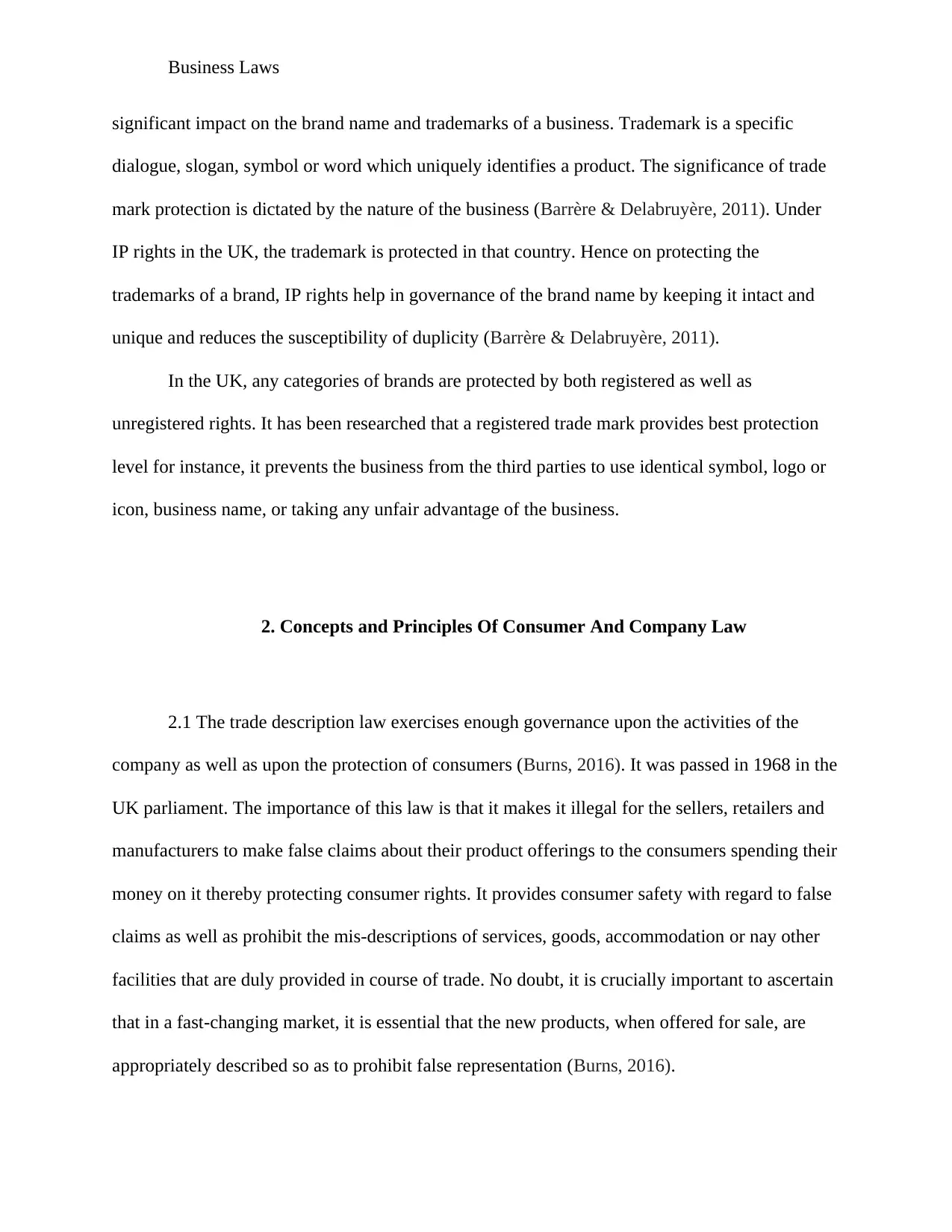
Business Laws
significant impact on the brand name and trademarks of a business. Trademark is a specific
dialogue, slogan, symbol or word which uniquely identifies a product. The significance of trade
mark protection is dictated by the nature of the business (Barrère & Delabruyère, 2011). Under
IP rights in the UK, the trademark is protected in that country. Hence on protecting the
trademarks of a brand, IP rights help in governance of the brand name by keeping it intact and
unique and reduces the susceptibility of duplicity (Barrère & Delabruyère, 2011).
In the UK, any categories of brands are protected by both registered as well as
unregistered rights. It has been researched that a registered trade mark provides best protection
level for instance, it prevents the business from the third parties to use identical symbol, logo or
icon, business name, or taking any unfair advantage of the business.
2. Concepts and Principles Of Consumer And Company Law
2.1 The trade description law exercises enough governance upon the activities of the
company as well as upon the protection of consumers (Burns, 2016). It was passed in 1968 in the
UK parliament. The importance of this law is that it makes it illegal for the sellers, retailers and
manufacturers to make false claims about their product offerings to the consumers spending their
money on it thereby protecting consumer rights. It provides consumer safety with regard to false
claims as well as prohibit the mis-descriptions of services, goods, accommodation or nay other
facilities that are duly provided in course of trade. No doubt, it is crucially important to ascertain
that in a fast-changing market, it is essential that the new products, when offered for sale, are
appropriately described so as to prohibit false representation (Burns, 2016).
significant impact on the brand name and trademarks of a business. Trademark is a specific
dialogue, slogan, symbol or word which uniquely identifies a product. The significance of trade
mark protection is dictated by the nature of the business (Barrère & Delabruyère, 2011). Under
IP rights in the UK, the trademark is protected in that country. Hence on protecting the
trademarks of a brand, IP rights help in governance of the brand name by keeping it intact and
unique and reduces the susceptibility of duplicity (Barrère & Delabruyère, 2011).
In the UK, any categories of brands are protected by both registered as well as
unregistered rights. It has been researched that a registered trade mark provides best protection
level for instance, it prevents the business from the third parties to use identical symbol, logo or
icon, business name, or taking any unfair advantage of the business.
2. Concepts and Principles Of Consumer And Company Law
2.1 The trade description law exercises enough governance upon the activities of the
company as well as upon the protection of consumers (Burns, 2016). It was passed in 1968 in the
UK parliament. The importance of this law is that it makes it illegal for the sellers, retailers and
manufacturers to make false claims about their product offerings to the consumers spending their
money on it thereby protecting consumer rights. It provides consumer safety with regard to false
claims as well as prohibit the mis-descriptions of services, goods, accommodation or nay other
facilities that are duly provided in course of trade. No doubt, it is crucially important to ascertain
that in a fast-changing market, it is essential that the new products, when offered for sale, are
appropriately described so as to prohibit false representation (Burns, 2016).
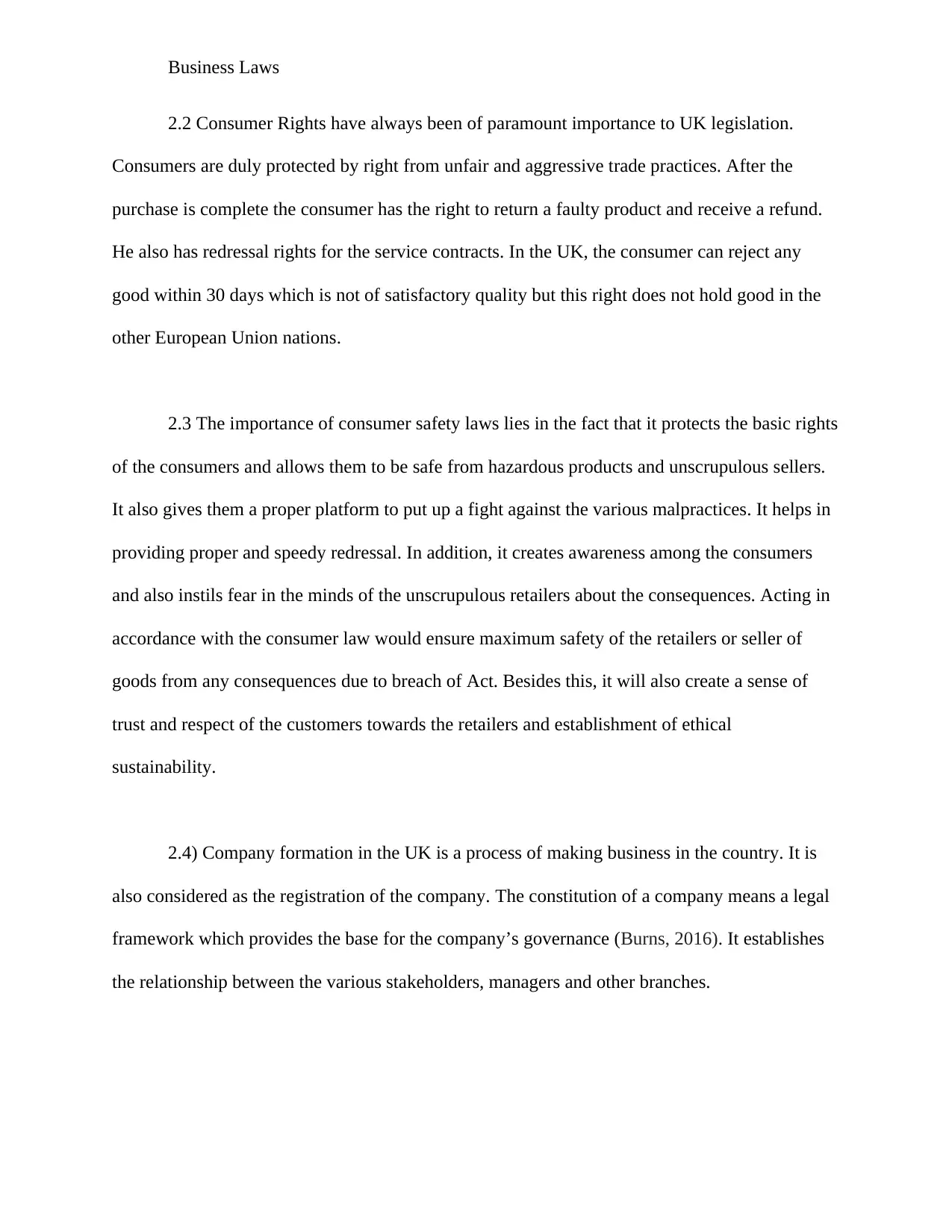
Business Laws
2.2 Consumer Rights have always been of paramount importance to UK legislation.
Consumers are duly protected by right from unfair and aggressive trade practices. After the
purchase is complete the consumer has the right to return a faulty product and receive a refund.
He also has redressal rights for the service contracts. In the UK, the consumer can reject any
good within 30 days which is not of satisfactory quality but this right does not hold good in the
other European Union nations.
2.3 The importance of consumer safety laws lies in the fact that it protects the basic rights
of the consumers and allows them to be safe from hazardous products and unscrupulous sellers.
It also gives them a proper platform to put up a fight against the various malpractices. It helps in
providing proper and speedy redressal. In addition, it creates awareness among the consumers
and also instils fear in the minds of the unscrupulous retailers about the consequences. Acting in
accordance with the consumer law would ensure maximum safety of the retailers or seller of
goods from any consequences due to breach of Act. Besides this, it will also create a sense of
trust and respect of the customers towards the retailers and establishment of ethical
sustainability.
2.4) Company formation in the UK is a process of making business in the country. It is
also considered as the registration of the company. The constitution of a company means a legal
framework which provides the base for the company’s governance (Burns, 2016). It establishes
the relationship between the various stakeholders, managers and other branches.
2.2 Consumer Rights have always been of paramount importance to UK legislation.
Consumers are duly protected by right from unfair and aggressive trade practices. After the
purchase is complete the consumer has the right to return a faulty product and receive a refund.
He also has redressal rights for the service contracts. In the UK, the consumer can reject any
good within 30 days which is not of satisfactory quality but this right does not hold good in the
other European Union nations.
2.3 The importance of consumer safety laws lies in the fact that it protects the basic rights
of the consumers and allows them to be safe from hazardous products and unscrupulous sellers.
It also gives them a proper platform to put up a fight against the various malpractices. It helps in
providing proper and speedy redressal. In addition, it creates awareness among the consumers
and also instils fear in the minds of the unscrupulous retailers about the consequences. Acting in
accordance with the consumer law would ensure maximum safety of the retailers or seller of
goods from any consequences due to breach of Act. Besides this, it will also create a sense of
trust and respect of the customers towards the retailers and establishment of ethical
sustainability.
2.4) Company formation in the UK is a process of making business in the country. It is
also considered as the registration of the company. The constitution of a company means a legal
framework which provides the base for the company’s governance (Burns, 2016). It establishes
the relationship between the various stakeholders, managers and other branches.
⊘ This is a preview!⊘
Do you want full access?
Subscribe today to unlock all pages.

Trusted by 1+ million students worldwide
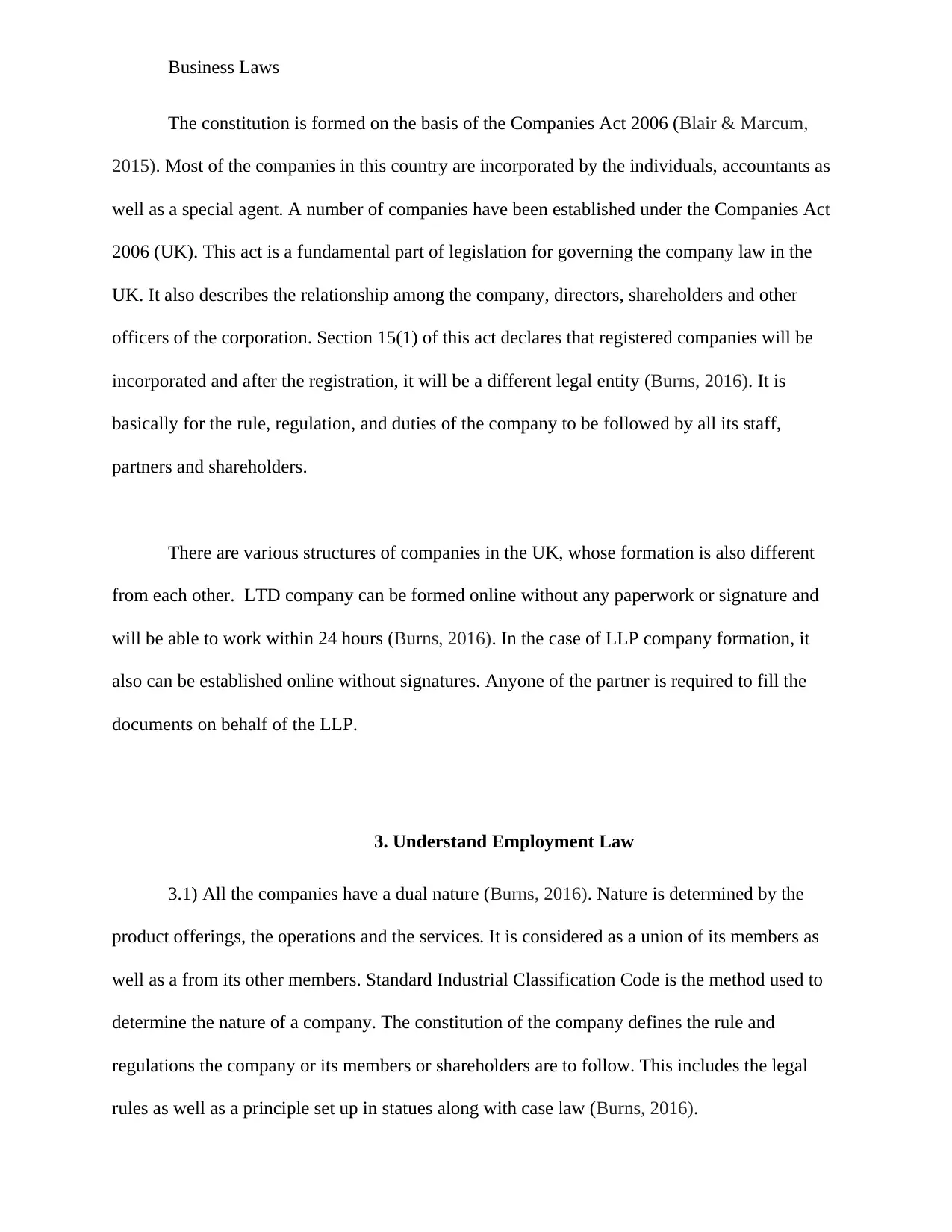
Business Laws
The constitution is formed on the basis of the Companies Act 2006 (Blair & Marcum,
2015). Most of the companies in this country are incorporated by the individuals, accountants as
well as a special agent. A number of companies have been established under the Companies Act
2006 (UK). This act is a fundamental part of legislation for governing the company law in the
UK. It also describes the relationship among the company, directors, shareholders and other
officers of the corporation. Section 15(1) of this act declares that registered companies will be
incorporated and after the registration, it will be a different legal entity (Burns, 2016). It is
basically for the rule, regulation, and duties of the company to be followed by all its staff,
partners and shareholders.
There are various structures of companies in the UK, whose formation is also different
from each other. LTD company can be formed online without any paperwork or signature and
will be able to work within 24 hours (Burns, 2016). In the case of LLP company formation, it
also can be established online without signatures. Anyone of the partner is required to fill the
documents on behalf of the LLP.
3. Understand Employment Law
3.1) All the companies have a dual nature (Burns, 2016). Nature is determined by the
product offerings, the operations and the services. It is considered as a union of its members as
well as a from its other members. Standard Industrial Classification Code is the method used to
determine the nature of a company. The constitution of the company defines the rule and
regulations the company or its members or shareholders are to follow. This includes the legal
rules as well as a principle set up in statues along with case law (Burns, 2016).
The constitution is formed on the basis of the Companies Act 2006 (Blair & Marcum,
2015). Most of the companies in this country are incorporated by the individuals, accountants as
well as a special agent. A number of companies have been established under the Companies Act
2006 (UK). This act is a fundamental part of legislation for governing the company law in the
UK. It also describes the relationship among the company, directors, shareholders and other
officers of the corporation. Section 15(1) of this act declares that registered companies will be
incorporated and after the registration, it will be a different legal entity (Burns, 2016). It is
basically for the rule, regulation, and duties of the company to be followed by all its staff,
partners and shareholders.
There are various structures of companies in the UK, whose formation is also different
from each other. LTD company can be formed online without any paperwork or signature and
will be able to work within 24 hours (Burns, 2016). In the case of LLP company formation, it
also can be established online without signatures. Anyone of the partner is required to fill the
documents on behalf of the LLP.
3. Understand Employment Law
3.1) All the companies have a dual nature (Burns, 2016). Nature is determined by the
product offerings, the operations and the services. It is considered as a union of its members as
well as a from its other members. Standard Industrial Classification Code is the method used to
determine the nature of a company. The constitution of the company defines the rule and
regulations the company or its members or shareholders are to follow. This includes the legal
rules as well as a principle set up in statues along with case law (Burns, 2016).
Paraphrase This Document
Need a fresh take? Get an instant paraphrase of this document with our AI Paraphraser
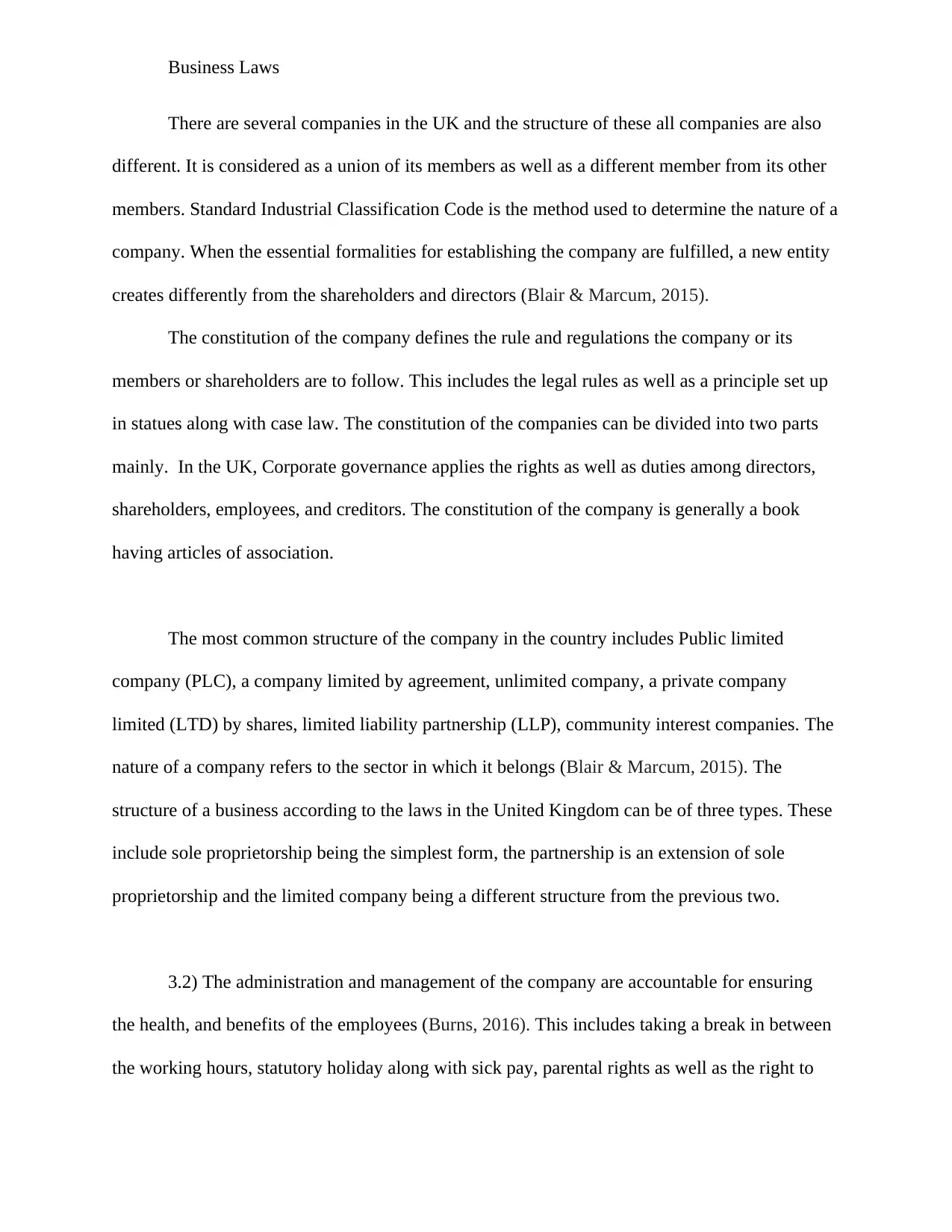
Business Laws
There are several companies in the UK and the structure of these all companies are also
different. It is considered as a union of its members as well as a different member from its other
members. Standard Industrial Classification Code is the method used to determine the nature of a
company. When the essential formalities for establishing the company are fulfilled, a new entity
creates differently from the shareholders and directors (Blair & Marcum, 2015).
The constitution of the company defines the rule and regulations the company or its
members or shareholders are to follow. This includes the legal rules as well as a principle set up
in statues along with case law. The constitution of the companies can be divided into two parts
mainly. In the UK, Corporate governance applies the rights as well as duties among directors,
shareholders, employees, and creditors. The constitution of the company is generally a book
having articles of association.
The most common structure of the company in the country includes Public limited
company (PLC), a company limited by agreement, unlimited company, a private company
limited (LTD) by shares, limited liability partnership (LLP), community interest companies. The
nature of a company refers to the sector in which it belongs (Blair & Marcum, 2015). The
structure of a business according to the laws in the United Kingdom can be of three types. These
include sole proprietorship being the simplest form, the partnership is an extension of sole
proprietorship and the limited company being a different structure from the previous two.
3.2) The administration and management of the company are accountable for ensuring
the health, and benefits of the employees (Burns, 2016). This includes taking a break in between
the working hours, statutory holiday along with sick pay, parental rights as well as the right to
There are several companies in the UK and the structure of these all companies are also
different. It is considered as a union of its members as well as a different member from its other
members. Standard Industrial Classification Code is the method used to determine the nature of a
company. When the essential formalities for establishing the company are fulfilled, a new entity
creates differently from the shareholders and directors (Blair & Marcum, 2015).
The constitution of the company defines the rule and regulations the company or its
members or shareholders are to follow. This includes the legal rules as well as a principle set up
in statues along with case law. The constitution of the companies can be divided into two parts
mainly. In the UK, Corporate governance applies the rights as well as duties among directors,
shareholders, employees, and creditors. The constitution of the company is generally a book
having articles of association.
The most common structure of the company in the country includes Public limited
company (PLC), a company limited by agreement, unlimited company, a private company
limited (LTD) by shares, limited liability partnership (LLP), community interest companies. The
nature of a company refers to the sector in which it belongs (Blair & Marcum, 2015). The
structure of a business according to the laws in the United Kingdom can be of three types. These
include sole proprietorship being the simplest form, the partnership is an extension of sole
proprietorship and the limited company being a different structure from the previous two.
3.2) The administration and management of the company are accountable for ensuring
the health, and benefits of the employees (Burns, 2016). This includes taking a break in between
the working hours, statutory holiday along with sick pay, parental rights as well as the right to
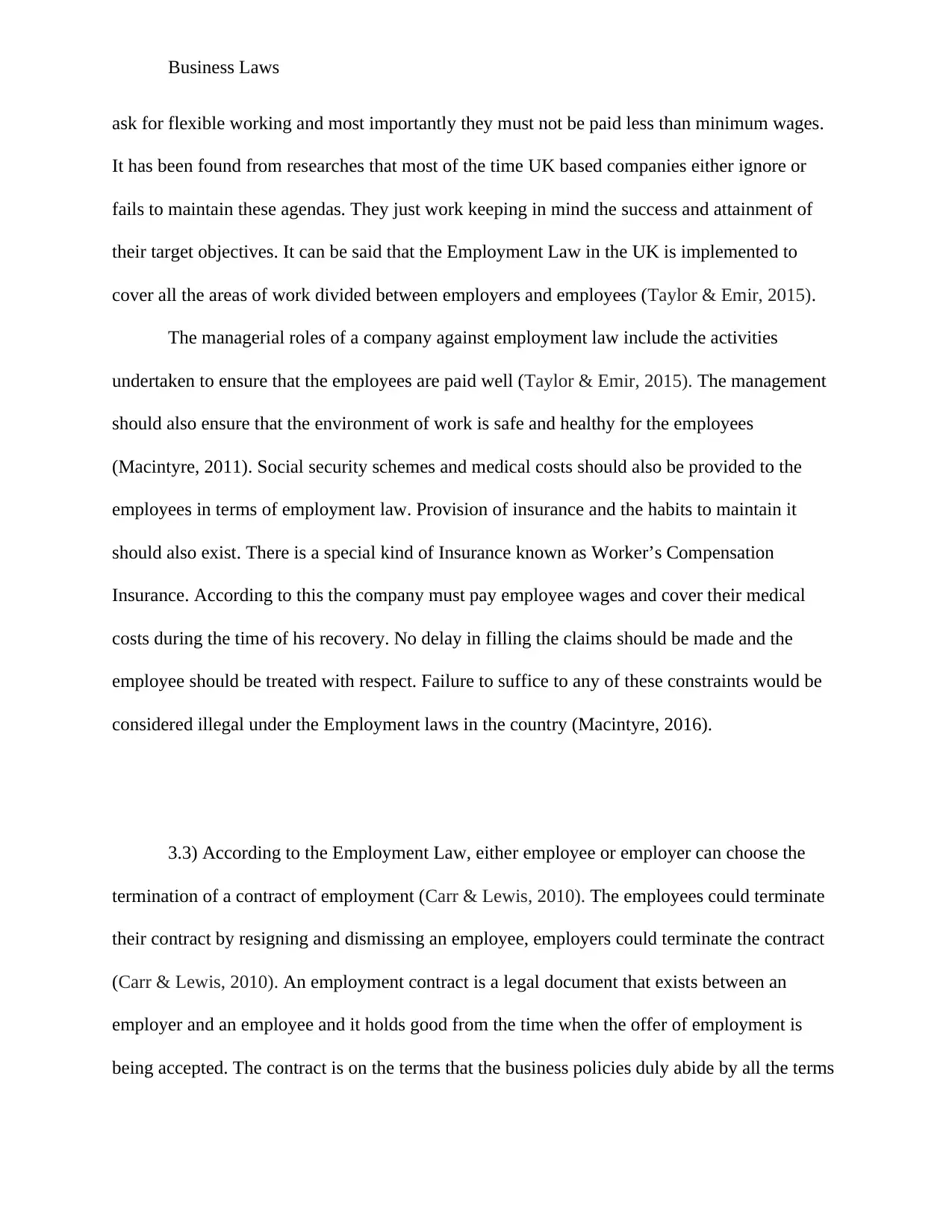
Business Laws
ask for flexible working and most importantly they must not be paid less than minimum wages.
It has been found from researches that most of the time UK based companies either ignore or
fails to maintain these agendas. They just work keeping in mind the success and attainment of
their target objectives. It can be said that the Employment Law in the UK is implemented to
cover all the areas of work divided between employers and employees (Taylor & Emir, 2015).
The managerial roles of a company against employment law include the activities
undertaken to ensure that the employees are paid well (Taylor & Emir, 2015). The management
should also ensure that the environment of work is safe and healthy for the employees
(Macintyre, 2011). Social security schemes and medical costs should also be provided to the
employees in terms of employment law. Provision of insurance and the habits to maintain it
should also exist. There is a special kind of Insurance known as Worker’s Compensation
Insurance. According to this the company must pay employee wages and cover their medical
costs during the time of his recovery. No delay in filling the claims should be made and the
employee should be treated with respect. Failure to suffice to any of these constraints would be
considered illegal under the Employment laws in the country (Macintyre, 2016).
3.3) According to the Employment Law, either employee or employer can choose the
termination of a contract of employment (Carr & Lewis, 2010). The employees could terminate
their contract by resigning and dismissing an employee, employers could terminate the contract
(Carr & Lewis, 2010). An employment contract is a legal document that exists between an
employer and an employee and it holds good from the time when the offer of employment is
being accepted. The contract is on the terms that the business policies duly abide by all the terms
ask for flexible working and most importantly they must not be paid less than minimum wages.
It has been found from researches that most of the time UK based companies either ignore or
fails to maintain these agendas. They just work keeping in mind the success and attainment of
their target objectives. It can be said that the Employment Law in the UK is implemented to
cover all the areas of work divided between employers and employees (Taylor & Emir, 2015).
The managerial roles of a company against employment law include the activities
undertaken to ensure that the employees are paid well (Taylor & Emir, 2015). The management
should also ensure that the environment of work is safe and healthy for the employees
(Macintyre, 2011). Social security schemes and medical costs should also be provided to the
employees in terms of employment law. Provision of insurance and the habits to maintain it
should also exist. There is a special kind of Insurance known as Worker’s Compensation
Insurance. According to this the company must pay employee wages and cover their medical
costs during the time of his recovery. No delay in filling the claims should be made and the
employee should be treated with respect. Failure to suffice to any of these constraints would be
considered illegal under the Employment laws in the country (Macintyre, 2016).
3.3) According to the Employment Law, either employee or employer can choose the
termination of a contract of employment (Carr & Lewis, 2010). The employees could terminate
their contract by resigning and dismissing an employee, employers could terminate the contract
(Carr & Lewis, 2010). An employment contract is a legal document that exists between an
employer and an employee and it holds good from the time when the offer of employment is
being accepted. The contract is on the terms that the business policies duly abide by all the terms
⊘ This is a preview!⊘
Do you want full access?
Subscribe today to unlock all pages.

Trusted by 1+ million students worldwide
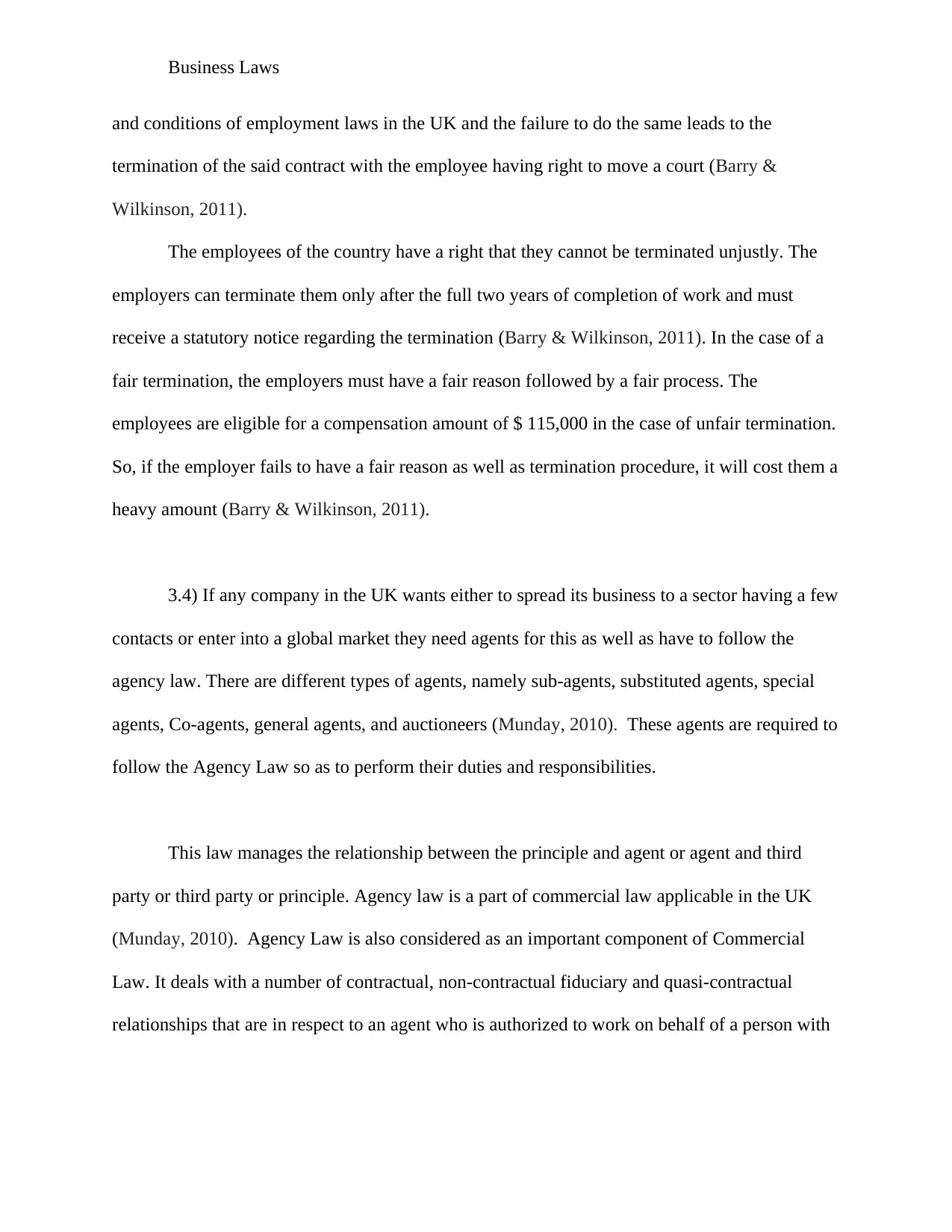
Business Laws
and conditions of employment laws in the UK and the failure to do the same leads to the
termination of the said contract with the employee having right to move a court (Barry &
Wilkinson, 2011).
The employees of the country have a right that they cannot be terminated unjustly. The
employers can terminate them only after the full two years of completion of work and must
receive a statutory notice regarding the termination (Barry & Wilkinson, 2011). In the case of a
fair termination, the employers must have a fair reason followed by a fair process. The
employees are eligible for a compensation amount of $ 115,000 in the case of unfair termination.
So, if the employer fails to have a fair reason as well as termination procedure, it will cost them a
heavy amount (Barry & Wilkinson, 2011).
3.4) If any company in the UK wants either to spread its business to a sector having a few
contacts or enter into a global market they need agents for this as well as have to follow the
agency law. There are different types of agents, namely sub-agents, substituted agents, special
agents, Co-agents, general agents, and auctioneers (Munday, 2010). These agents are required to
follow the Agency Law so as to perform their duties and responsibilities.
This law manages the relationship between the principle and agent or agent and third
party or third party or principle. Agency law is a part of commercial law applicable in the UK
(Munday, 2010). Agency Law is also considered as an important component of Commercial
Law. It deals with a number of contractual, non-contractual fiduciary and quasi-contractual
relationships that are in respect to an agent who is authorized to work on behalf of a person with
and conditions of employment laws in the UK and the failure to do the same leads to the
termination of the said contract with the employee having right to move a court (Barry &
Wilkinson, 2011).
The employees of the country have a right that they cannot be terminated unjustly. The
employers can terminate them only after the full two years of completion of work and must
receive a statutory notice regarding the termination (Barry & Wilkinson, 2011). In the case of a
fair termination, the employers must have a fair reason followed by a fair process. The
employees are eligible for a compensation amount of $ 115,000 in the case of unfair termination.
So, if the employer fails to have a fair reason as well as termination procedure, it will cost them a
heavy amount (Barry & Wilkinson, 2011).
3.4) If any company in the UK wants either to spread its business to a sector having a few
contacts or enter into a global market they need agents for this as well as have to follow the
agency law. There are different types of agents, namely sub-agents, substituted agents, special
agents, Co-agents, general agents, and auctioneers (Munday, 2010). These agents are required to
follow the Agency Law so as to perform their duties and responsibilities.
This law manages the relationship between the principle and agent or agent and third
party or third party or principle. Agency law is a part of commercial law applicable in the UK
(Munday, 2010). Agency Law is also considered as an important component of Commercial
Law. It deals with a number of contractual, non-contractual fiduciary and quasi-contractual
relationships that are in respect to an agent who is authorized to work on behalf of a person with
Paraphrase This Document
Need a fresh take? Get an instant paraphrase of this document with our AI Paraphraser
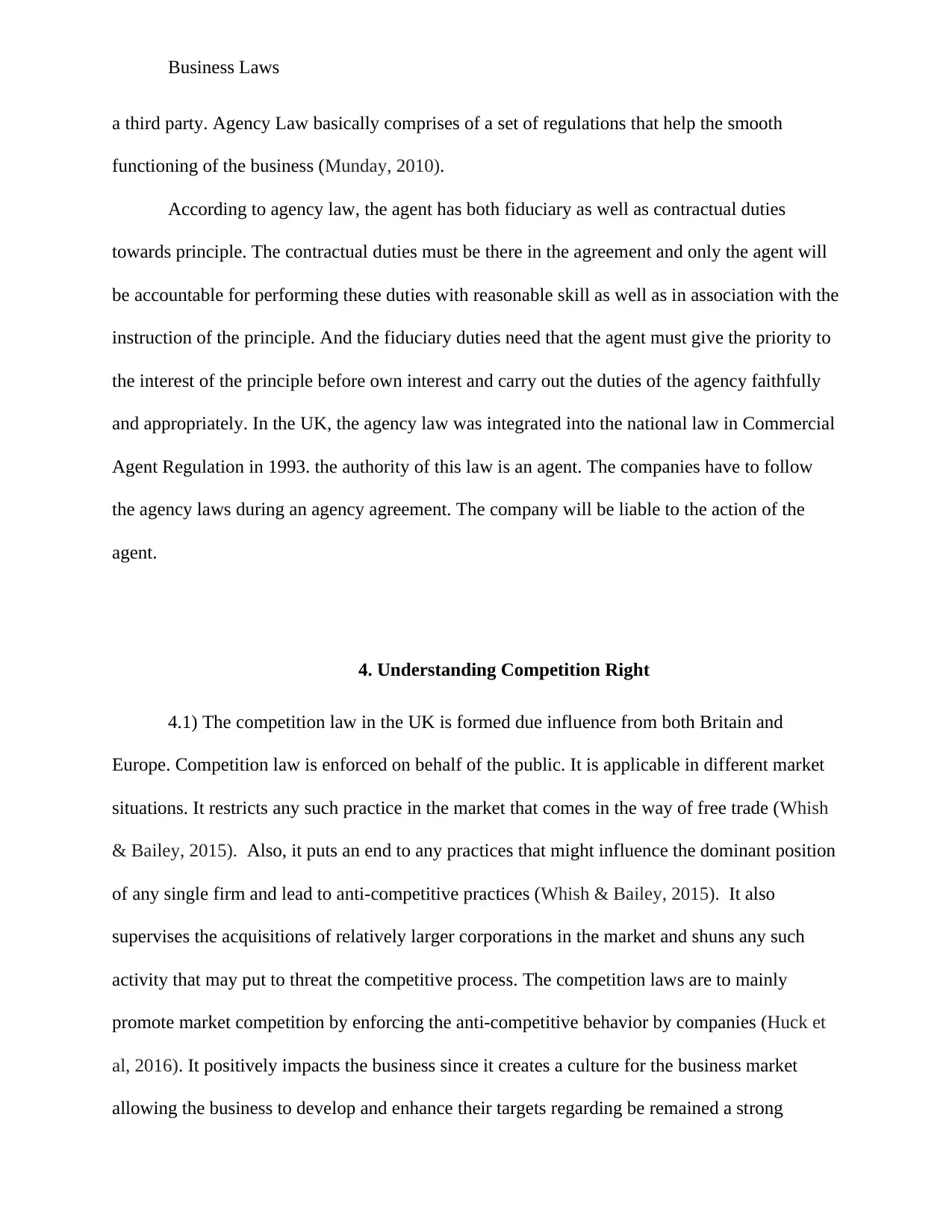
Business Laws
a third party. Agency Law basically comprises of a set of regulations that help the smooth
functioning of the business (Munday, 2010).
According to agency law, the agent has both fiduciary as well as contractual duties
towards principle. The contractual duties must be there in the agreement and only the agent will
be accountable for performing these duties with reasonable skill as well as in association with the
instruction of the principle. And the fiduciary duties need that the agent must give the priority to
the interest of the principle before own interest and carry out the duties of the agency faithfully
and appropriately. In the UK, the agency law was integrated into the national law in Commercial
Agent Regulation in 1993. the authority of this law is an agent. The companies have to follow
the agency laws during an agency agreement. The company will be liable to the action of the
agent.
4. Understanding Competition Right
4.1) The competition law in the UK is formed due influence from both Britain and
Europe. Competition law is enforced on behalf of the public. It is applicable in different market
situations. It restricts any such practice in the market that comes in the way of free trade (Whish
& Bailey, 2015). Also, it puts an end to any practices that might influence the dominant position
of any single firm and lead to anti-competitive practices (Whish & Bailey, 2015). It also
supervises the acquisitions of relatively larger corporations in the market and shuns any such
activity that may put to threat the competitive process. The competition laws are to mainly
promote market competition by enforcing the anti-competitive behavior by companies (Huck et
al, 2016). It positively impacts the business since it creates a culture for the business market
allowing the business to develop and enhance their targets regarding be remained a strong
a third party. Agency Law basically comprises of a set of regulations that help the smooth
functioning of the business (Munday, 2010).
According to agency law, the agent has both fiduciary as well as contractual duties
towards principle. The contractual duties must be there in the agreement and only the agent will
be accountable for performing these duties with reasonable skill as well as in association with the
instruction of the principle. And the fiduciary duties need that the agent must give the priority to
the interest of the principle before own interest and carry out the duties of the agency faithfully
and appropriately. In the UK, the agency law was integrated into the national law in Commercial
Agent Regulation in 1993. the authority of this law is an agent. The companies have to follow
the agency laws during an agency agreement. The company will be liable to the action of the
agent.
4. Understanding Competition Right
4.1) The competition law in the UK is formed due influence from both Britain and
Europe. Competition law is enforced on behalf of the public. It is applicable in different market
situations. It restricts any such practice in the market that comes in the way of free trade (Whish
& Bailey, 2015). Also, it puts an end to any practices that might influence the dominant position
of any single firm and lead to anti-competitive practices (Whish & Bailey, 2015). It also
supervises the acquisitions of relatively larger corporations in the market and shuns any such
activity that may put to threat the competitive process. The competition laws are to mainly
promote market competition by enforcing the anti-competitive behavior by companies (Huck et
al, 2016). It positively impacts the business since it creates a culture for the business market
allowing the business to develop and enhance their targets regarding be remained a strong
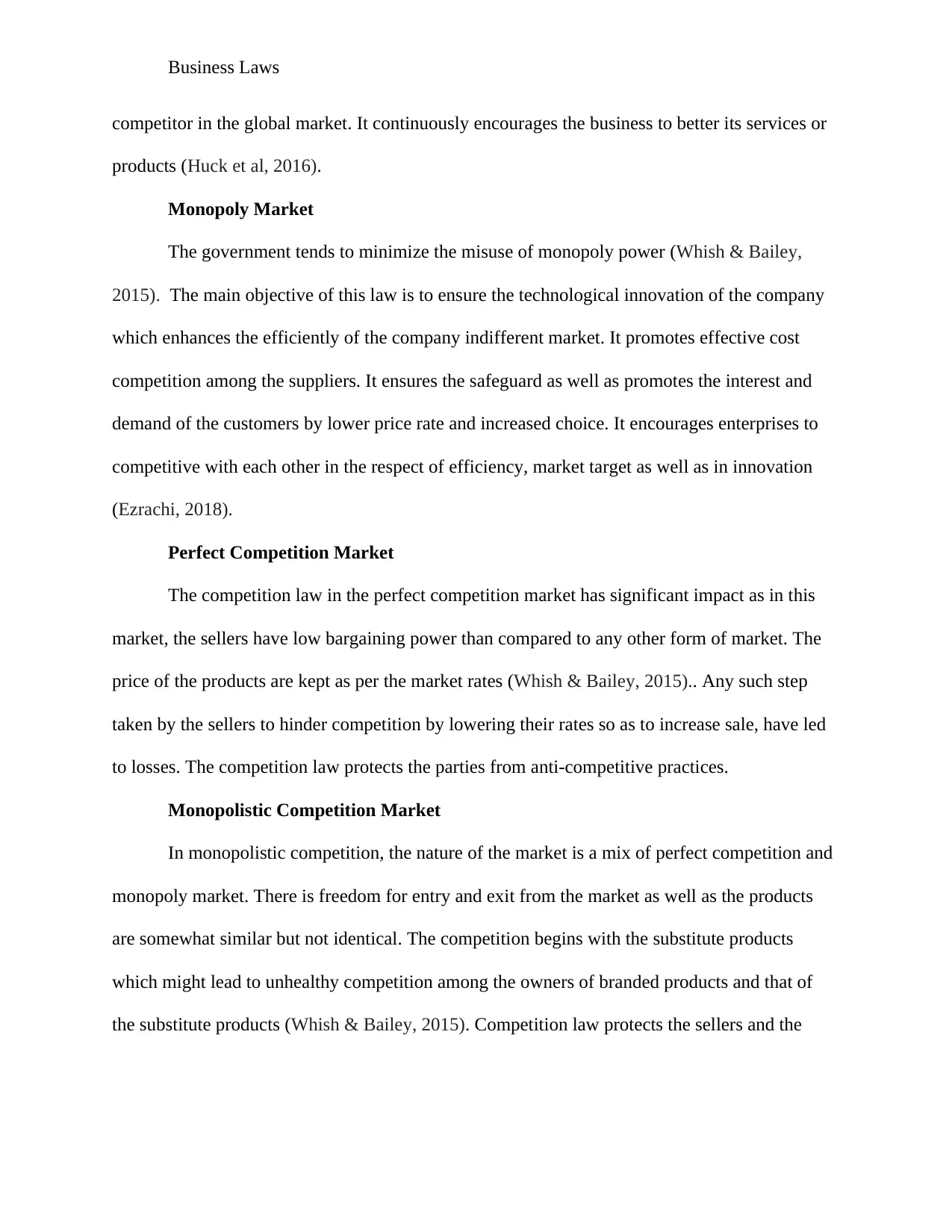
Business Laws
competitor in the global market. It continuously encourages the business to better its services or
products (Huck et al, 2016).
Monopoly Market
The government tends to minimize the misuse of monopoly power (Whish & Bailey,
2015). The main objective of this law is to ensure the technological innovation of the company
which enhances the efficiently of the company indifferent market. It promotes effective cost
competition among the suppliers. It ensures the safeguard as well as promotes the interest and
demand of the customers by lower price rate and increased choice. It encourages enterprises to
competitive with each other in the respect of efficiency, market target as well as in innovation
(Ezrachi, 2018).
Perfect Competition Market
The competition law in the perfect competition market has significant impact as in this
market, the sellers have low bargaining power than compared to any other form of market. The
price of the products are kept as per the market rates (Whish & Bailey, 2015).. Any such step
taken by the sellers to hinder competition by lowering their rates so as to increase sale, have led
to losses. The competition law protects the parties from anti-competitive practices.
Monopolistic Competition Market
In monopolistic competition, the nature of the market is a mix of perfect competition and
monopoly market. There is freedom for entry and exit from the market as well as the products
are somewhat similar but not identical. The competition begins with the substitute products
which might lead to unhealthy competition among the owners of branded products and that of
the substitute products (Whish & Bailey, 2015). Competition law protects the sellers and the
competitor in the global market. It continuously encourages the business to better its services or
products (Huck et al, 2016).
Monopoly Market
The government tends to minimize the misuse of monopoly power (Whish & Bailey,
2015). The main objective of this law is to ensure the technological innovation of the company
which enhances the efficiently of the company indifferent market. It promotes effective cost
competition among the suppliers. It ensures the safeguard as well as promotes the interest and
demand of the customers by lower price rate and increased choice. It encourages enterprises to
competitive with each other in the respect of efficiency, market target as well as in innovation
(Ezrachi, 2018).
Perfect Competition Market
The competition law in the perfect competition market has significant impact as in this
market, the sellers have low bargaining power than compared to any other form of market. The
price of the products are kept as per the market rates (Whish & Bailey, 2015).. Any such step
taken by the sellers to hinder competition by lowering their rates so as to increase sale, have led
to losses. The competition law protects the parties from anti-competitive practices.
Monopolistic Competition Market
In monopolistic competition, the nature of the market is a mix of perfect competition and
monopoly market. There is freedom for entry and exit from the market as well as the products
are somewhat similar but not identical. The competition begins with the substitute products
which might lead to unhealthy competition among the owners of branded products and that of
the substitute products (Whish & Bailey, 2015). Competition law protects the sellers and the
⊘ This is a preview!⊘
Do you want full access?
Subscribe today to unlock all pages.

Trusted by 1+ million students worldwide
1 out of 15
Related Documents
Your All-in-One AI-Powered Toolkit for Academic Success.
+13062052269
info@desklib.com
Available 24*7 on WhatsApp / Email
![[object Object]](/_next/static/media/star-bottom.7253800d.svg)
Unlock your academic potential
Copyright © 2020–2026 A2Z Services. All Rights Reserved. Developed and managed by ZUCOL.




